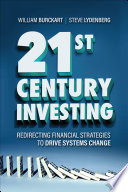

In the 21st century, investing has evolved significantly due to advancements in technology, globalization, and changing market dynamics. Traditional investment strategies, which often relied heavily on historical data and fundamental analysis, are now complemented by quantitative models and algorithmic trading. This evolution has led to the emergence of new asset classes, such as cryptocurrencies and impact investing, which prioritize social and environmental outcomes alongside financial returns. Investors must adapt to these changes by embracing a more holistic approach that considers not only financial metrics but also ethical implications and the broader impact of their investments.
Continue readingTechnology has revolutionized the investment landscape, providing tools that enhance data analysis, improve trading efficiency, and democratize access to investment opportunities. Robo-advisors, for instance, have made it easier for individuals to invest with minimal fees and personalized strategies. Additionally, big data analytics and artificial intelligence are enabling investors to make more informed decisions by analyzing vast amounts of information in real-time. However, this reliance on technology also comes with risks, such as cybersecurity threats and the potential for algorithmic trading to exacerbate market volatility. Investors must navigate these complexities while leveraging technology to gain a competitive edge.
Continue readingThe growing awareness of environmental, social, and governance (ESG) factors has transformed the investment landscape, pushing investors to consider the sustainability of their portfolios. Sustainable investing not only aims for financial returns but also seeks to create positive societal impact. This shift is driven by changing consumer preferences, regulatory pressures, and the recognition that companies with strong ESG practices often outperform their peers in the long run. Investors are encouraged to integrate ESG criteria into their investment processes, as this alignment can lead to better risk management and enhanced long-term performance.
Continue readingDiversification remains a cornerstone of investment strategy in the 21st century. Given the increased volatility and interconnectedness of global markets, a well-diversified portfolio can help mitigate risks and enhance returns. Investors are encouraged to explore a range of asset classes, including stocks, bonds, real estate, and alternative investments, to create a balanced portfolio that can withstand market fluctuations. Furthermore, diversification should extend beyond geographical boundaries, as investing in emerging markets can provide opportunities for growth that are not available in developed economies.
Continue readingUnderstanding behavioral finance is essential for successful investing in the modern era. Investors are often influenced by cognitive biases and emotional factors that can lead to irrational decision-making. The book emphasizes the importance of self-awareness and discipline in overcoming these biases. By recognizing tendencies such as overconfidence, loss aversion, and herd behavior, investors can make more rational choices and avoid common pitfalls. Incorporating behavioral insights into investment strategies can improve outcomes and foster a more resilient investment mindset.
Continue readingGlobalization has reshaped the investment landscape, creating both opportunities and challenges for investors. With increased access to international markets, investors can diversify their portfolios and tap into growth in emerging economies. However, globalization also introduces complexities, such as geopolitical risks, currency fluctuations, and regulatory differences. The book advocates for a comprehensive understanding of global trends and their implications for investment decisions. Investors must stay informed about global economic indicators and geopolitical developments to navigate this interconnected environment effectively.
Continue readingLooking ahead, the future of investing will likely be shaped by technological advancements, demographic shifts, and changing societal values. The rise of digital assets, such as cryptocurrencies and tokenized securities, presents new opportunities for innovation in investment strategies. Additionally, as younger generations become more influential in the market, their preferences for ethical and sustainable investing will drive further changes. Investors must remain adaptable and open to new ideas, continually reassessing their strategies to align with emerging trends and the evolving investment landscape.
Continue readingThe reading time for 21st Century Investing depends on the reader's pace. However, this concise book summary covers the 7 key ideas from 21st Century Investing, allowing you to quickly understand the main concepts, insights, and practical applications in around 25 min.
21st Century Investing is definitely worth reading. The book covers essential topics including The Evolution of Investment Strategies, The Role of Technology in Investing, Sustainable and Responsible Investing, providing practical insights and actionable advice. Whether you read the full book or our concise summary, 21st Century Investing delivers valuable knowledge that can help you improve your understanding and apply these concepts in your personal or professional life.
21st Century Investing was written by Steven Lydenberg, William Burckart.
If you enjoyed 21st Century Investing by Steven Lydenberg, William Burckart and want to explore similar topics or deepen your understanding, we highly recommend these related book summaries:
These books cover related themes, complementary concepts, and will help you build upon the knowledge gained from 21st Century Investing. Each of these summaries provides concise insights that can further enhance your understanding and practical application of the ideas presented in 21st Century Investing.